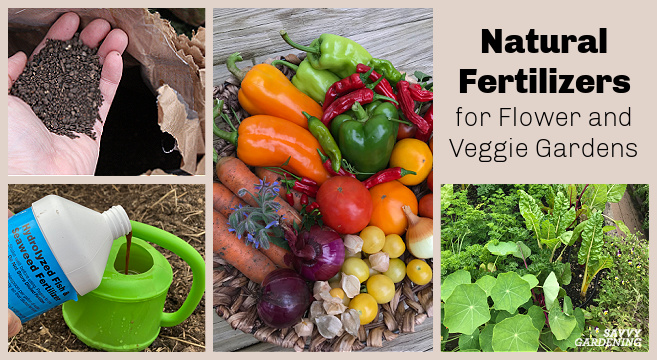The Best Organic Fertilizer for Vegetable Garden is compost, which provides essential nutrients for plant growth and improves soil quality. Compost is a natural and sustainable option that enriches the soil with organic matter, enhances water retention, and promotes beneficial soil organisms.
It is easy to make compost at home by combining kitchen scraps, yard waste, and other organic materials. Applying a layer of compost to the vegetable garden a few times a year can significantly enhance the fertility of the soil, resulting in healthy and productive vegetable plants.
Additionally, composting helps reduce waste and promotes environmental sustainability.
[ez-toc]

Credit: www.amazon.com
1. Importance Of Organic Fertilizers
Organic fertilizers play a crucial role in maintaining the health and productivity of your vegetable garden. Unlike their synthetic counterparts, organic fertilizers are made from naturally occurring substances such as compost, manure, and plant remains. The use of organic fertilizers offers several benefits that not only ensure lush and bountiful vegetable plants but also contribute to the overall well-being of the environment and the people who consume the produce.
1.1 Nutrient-rich Soil
One of the significant advantages of using organic fertilizers is their ability to provide essential nutrients to the soil. These fertilizers, derived from organic matter, are packed with macronutrients like nitrogen, phosphorus, and potassium, as well as micronutrients like calcium, iron, and zinc. When organic fertilizers are added to the garden soil, they slowly release these nutrients, ensuring a steady and sustained supply, which is essential for the optimal growth and development of the vegetables.
1.2 Environment-friendly
The environmental impact of using organic fertilizers is significantly lower compared to synthetic fertilizers. Organic fertilizers are derived from renewable sources, reducing the reliance on non-renewable resources. Furthermore, they promote the long-term health of the soil by improving its structure and enhancing its ability to retain water and nutrients. By choosing organic fertilizers, you contribute to the conservation of soil quality and minimize the risk of harmful chemicals leaching into water sources.
1.3 Healthier Vegetables
Organic fertilizers are known to promote the production of healthier vegetables. The slow-release nature of these fertilizers ensures a steady supply of nutrients, allowing plants to absorb them at a balanced rate. This promotes strong root development, disease resistance, and overall plant vigor. In turn, healthier plants produce vegetables that are packed with nutrients and flavor, making them more nutritious and enjoyable to consume.

Credit: savvygardening.com
2. Factors To Consider When Choosing Organic Fertilizers
When it comes to selecting the best organic fertilizer for your vegetable garden, there are several factors that you should consider. These factors will greatly influence the success of your garden and the overall health of your plants. By considering the following aspects, you can make an informed decision and choose the organic fertilizer that is most suitable for your garden’s needs.
2.1 Soil Type And Composition
The first factor to consider is the soil type and composition of your vegetable garden. Different types of soil have varying nutrient levels and pH levels, which can affect the effectiveness of organic fertilizers. For example, sandy soil drains quickly and requires organic fertilizers that can retain moisture and nutrients. On the other hand, clay soil retains moisture but may lack proper aeration. Considering your soil type and composition will help you choose the right organic fertilizer that can optimize your soil’s nutrient balance.
2.2 Nutrient Requirements
The nutrient requirements of your vegetables play a crucial role in determining the type of organic fertilizer you should choose. Plants require specific nutrients, such as nitrogen, phosphorus, and potassium, for proper growth and development. Conducting a soil test can help you identify any nutrient deficiencies in your soil. Once you know which nutrients are lacking, you can select an organic fertilizer that provides the necessary nutrients to meet your plants’ requirements.
2.3 Application Method
Considering the application method of organic fertilizers is essential to ensure efficient and convenient usage. Some organic fertilizers come in granular form, which can be spread evenly across the garden bed. Others may come in liquid form, which can be applied directly to the plants’ roots or foliage. The application method should align with your gardening practices and the needs of your vegetables. Additionally, it’s crucial to follow the recommended dosage and application frequency mentioned on the fertilizer packaging.
2.4 Cost And Availability
Cost and availability are practical factors that should not be overlooked. Organic fertilizers can vary in price depending on their composition and brand. It’s important to determine the budget you can allocate for fertilizers and consider the long-term benefits they can provide. Furthermore, you should assess the accessibility and availability of the organic fertilizers in your area. Some fertilizers may not be easily accessible, or their availability may change seasonally, so selecting an option that is readily available will save you time and effort.
3. Top Organic Fertilizers For Vegetable Gardens
When it comes to ensuring healthy and productive vegetable gardens, choosing the right organic fertilizer is essential. Organic fertilizers not only provide essential nutrients to your plants but also improve soil fertility, promote root growth, and enhance overall plant health. In this section, we will discuss the top organic fertilizers for vegetable gardens, their benefits, and how to use them effectively to maximize your harvest.
3.1 Compost
Compost is an excellent organic fertilizer that enriches the soil and provides a wide range of nutrients, including nitrogen, phosphorus, and potassium. It improves soil structure, retains moisture, and enhances microbial activity, creating an ideal growing environment for your vegetables. Compost can be made from kitchen scraps, yard waste, or a combination of both. Simply spread a layer of compost around your plants and gently mix it into the top few inches of soil. Apply compost every few weeks throughout the growing season to maintain soil fertility.
3.2 Manure
Manure is another valuable organic fertilizer that enriches the soil with essential nutrients and organic matter. Cow, horse, chicken, and rabbit manure are commonly used in vegetable gardens. Before using manure, it is crucial to compost it properly to eliminate any potential pathogens. Once composted, mix the manure into the soil or apply it as a top dressing around the base of your plants. Remember to water thoroughly after applying manure to prevent burning the plant roots.
3.3 Fish Emulsion
Fish emulsion is a nutrient-rich organic fertilizer made from fish byproducts. It is an excellent source of nitrogen, phosphorus, and trace minerals that promote vigorous plant growth. Fish emulsion is available in liquid form and can be easily diluted with water for application. Apply fish emulsion directly to the soil around the plant base or use it as a foliar spray. Regular applications every two weeks during the growing season will ensure a steady supply of nutrients for your vegetable plants.
3.4 Seaweed/kelp Fertilizer
Seaweed or kelp fertilizer is derived from seaweed or kelp extracts and is highly beneficial for vegetable gardens. It contains a wide range of nutrients, including potassium, which promotes root development, improves plant resistance to stress, and enhances overall plant health. Seaweed or kelp fertilizer is available in liquid or granular form. To apply, simply dilute with water according to the package instructions and apply around the plant base or as a foliar spray. Regular applications every few weeks will help your plants thrive.
3.5 Bone Meal
Bone meal is a natural fertilizer made from ground animal bones. It is an excellent source of phosphorus and calcium, essential nutrients for root development and overall plant growth. Bone meal is particularly beneficial for vegetable crops that require high phosphorus levels, such as tomatoes or peppers. Apply bone meal by mixing it into the planting hole or applying it as a side dressing around the base of established plants. Avoid direct contact with plant roots to prevent burning.
4. How To Use Organic Fertilizers Effectively
Using organic fertilizers effectively is crucial for the successful growth of your vegetable garden. By understanding the best practices for applying these natural nutrients, you can ensure a bountiful harvest of healthy, vibrant vegetables. Below, we’ll explore the key strategies for using organic fertilizers effectively in your garden.
4.1 Preparing The Soil
Before applying organic fertilizers to your vegetable garden, it’s essential to prepare the soil to maximize their effectiveness. Start by testing the soil to determine its pH level and nutrient composition. Amend the soil as needed to create a nutrient-rich, well-balanced environment for your plants. Incorporate compost and organic matter to improve soil structure and fertility. This allows the soil to retain moisture and nutrients, providing an optimal foundation for your vegetable garden.
4.2 Application Techniques
When using organic fertilizers, it’s important to apply them strategically to ensure they reach the plant roots and promote healthy growth. Utilize techniques such as top-dressing, which involves spreading fertilizers on the soil surface around the base of plants. This method allows for gradual nutrient release as the fertilizer breaks down. Additionally, consider incorporating fertilizers into the soil during planting or by side dressing alongside the plants. These techniques help deliver essential nutrients directly to the root zone, facilitating efficient nutrient uptake by your vegetable plants.
4.3 Timing And Frequency
Timing and frequency are critical factors in maximizing the benefits of organic fertilizers for your vegetable garden. Apply fertilizers at the appropriate times, such as during the initial planting, before flowering, and as needed during the growing season. Regular application of organic fertilizers ensures a continuous supply of nutrients for your plants, supporting their development and yield. Be mindful of the specific nutrient requirements of each vegetable variety and adjust the application frequency accordingly to maintain an optimal balance of nutrients in the soil.
5. Tips For Maximizing Vegetable Garden Harvest With Organic Fertilizers
If you want to maximize your vegetable garden harvest using organic fertilizers, there are some crucial tips to consider. By implementing these strategies, you can ensure that your garden thrives and produces a bountiful and healthy yield. Let’s explore five essential tips for maximizing your vegetable garden harvest with organic fertilizers.
Crop Rotation
Crop rotation is a vital practice that involves changing the location of where vegetables are planted each season. This method helps to prevent the build-up of pests and diseases. By rotating the placement of crops, you can maintain soil health and fertility, leading to more robust and healthier plants.
Companion Planting
Companion planting is a natural method that involves growing certain plants together to boost each other’s growth and deter pests. This technique helps maximize space, enhance nutrient availability, and increase pollination, resulting in a more abundant and diverse vegetable yield.
Mulching
Mulching is crucial for retaining moisture, suppressing weeds, and adding nutrients to the soil. Organic mulches, such as straw, grass clippings, or compost, break down over time, enriching the soil and fostering a healthy environment for vegetable growth.
Proper Watering
Proper watering is essential for maximizing the benefits of organic fertilizers. It’s crucial to water your vegetable garden efficiently, ensuring that the plants receive consistent moisture without being overwatered. Deep and infrequent watering encourages strong root development and overall plant health.
Frequently Asked Questions On Best Organic Fertilizer For Vegetable Garden
What Is The Best Organic Fertilizer For My Vegetable Garden?
The best organic fertilizer for your vegetable garden is compost. It enriches the soil with nutrients, improves soil structure, and enhances water retention. Compost is natural, cost-effective, and environmentally friendly, making it an ideal choice for promoting healthy plant growth and maximizing vegetable yields.
How Do You Fertilize A Vegetable Garden Organically?
To fertilize a vegetable garden organically, use compost or aged manure to enrich the soil. Spread a layer of organic mulch to retain moisture and suppress weeds. Use natural fertilizers like bone meal or fish emulsion. Rotate crops to prevent nutrient depletion and pests.
Water regularly and maintain proper garden hygiene.
How Do I Make Natural Fertilizer For My Vegetable Garden?
To make natural fertilizer for your vegetable garden, you can use compost made from kitchen scraps and yard waste. Mix the compost into the soil to enrich it with nutrients. Another option is to make compost tea by steeping compost in water and using it to water your plants.
What Is The Best Fertilizer For Peppers And Tomatoes?
The best fertilizer for peppers and tomatoes is a balanced, water-soluble fertilizer with a ratio of nitrogen, phosphorous, and potassium. It should have sufficient calcium to prevent blossom end rot. Apply it once a month during the growing season according to the package instructions.
Conclusion
Finding the best organic fertilizer for your vegetable garden is crucial to promote healthy plant growth and maximize your harvest. By choosing natural options that are rich in essential nutrients and beneficial microorganisms, you can ensure the long-term vitality of your plants and the health of your soil.
Remember to consider factors such as the nutrient content, release rate, and compatibility with your specific vegetables. So, invest in the right organic fertilizer and watch your garden thrive.


